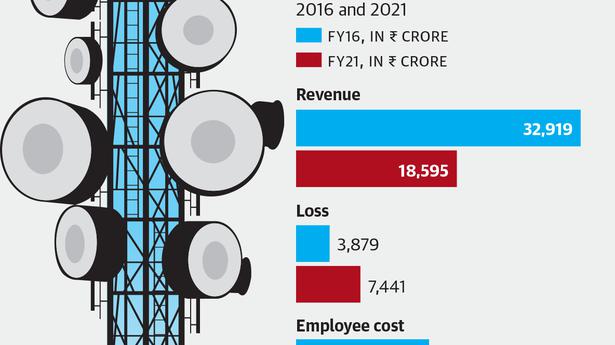
Explained| The government package to revive BSNL fortunes
The Hindu
What are the issues that have thwarted the telecom company’s expansion and growth?
The story so far: The Bharat Sanchar Nigam Ltd. (BSNL) was incorporated in September 2000 as a company to take over the business of providing telephone connectivity from the central government’s Department of Telecom Services. Its operations were meant to service the entire country except New Delhi and Mumbai where MTNL — or Mahanagar Telephone Nigam Ltd — would operate. Last week, the Union Cabinet approved a ₹1.64 lakh crore revival package for BSNL with a cash component of ₹43,964 crore.
The non-cash component of ₹1.2 lakh crore, spread over four years, will include administrative allotment of 4G spectrum worth ₹44,993 crore. Capex support of ₹22,471 crore over the next four years to “boost development and deployment of Atmanirbhar 4G stack”, viability gap funding of ₹13,789 crore for commercially unviable rural wireline operations done during 2014-15 to 2019-20, debt structuring by raising of bonds with sovereign guarantee worth ₹40,399 crore and financial support for AGR (Adjusted Gross Revenue) dues worth ₹33,404 crore complete the package.
Previously, in 2019, the Cabinet had cleared a package worth close to ₹70,000 crore for the revival of BSNL and MTNL, mainly to fund the Voluntary Retirement Scheme (VRS) package for the two firms.
BSNL had more than 1.5 lakh employees before the VRS was announced in 2019. About 78,000 had applied to exercise the option. Before the VRS, FY20 numbers showed the loss at ₹15,500 crore, and employee costs at a staggering ₹13,600 crore.
As of June 2021, the employee headcount was 64,000. Note that BSNL spent more than 50% of revenue on employees in FY16. That came down in FY21 to 36%, but compares poorly with, for example, Bharti Airtel whose numbers showed employee expense at about 4% for both FY21 and FY22.
The government, which said that the 2019 package helped BSNL stabilise and the latest bailout would help it become viable, expects BSNL to become profitable in three to four years from now. Recently, Chairman P.K. Purwar has been quoted as saying that FY22 revenue would be a tad lower than the previous year at ₹17,000 crore.
A report by the Standing Committee on Information Technology presented to Parliament in 2014 under the Demand for Grants quotes a BSNL representative as saying that though private operators started offering mobile services in the late 1990s, BSNL could do so only in 2002. Despite this, it was among one of the top mobile service providers in most circles by 2005-06 when its expansion was going on in full swing. The deposition talks of problems to do with ‘non-procurement of equipment’ beginning at this time.











